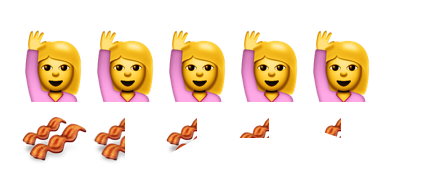Infinite Food Sampling

A man is doling food samples to a countably infinite number of people in a store. Each of them takes an amount x 1 , where the value of x is equal to their number in line. How many samples does the man need, to satisfy the food cravings of everyone?
This section requires Javascript.
You are seeing this because something didn't load right. We suggest you, (a) try
refreshing the page, (b) enabling javascript if it is disabled on your browser and,
finally, (c)
loading the
non-javascript version of this page
. We're sorry about the hassle.
3 solutions
That doesn't accumulate to two, it is the harmonic series, it doesn't converge to a finite value.
2 = 1 1 + 2 1 + 4 1 + 8 1 + 1 6 1 + … = 1 1 + 2 1 + 3 1 + 4 1 + …
The required number is lim n → ∞ H n , where H n = r = 1 ∑ n r 1
This limit doesn't exist as a real number (as H n is monotonically increasing and unbounded above). In fact, n → ∞ lim ( H n − l o g e n ) = γ ≈ 0 . 5 7 7 Where γ is the Euler-Macheroni constant. Also, H 5 ≈ 2 . 2 8 3 3 > 2 . 2 5
Hence, the answer is undefined (as long as we limit our discussion to the real number system).
EDIT: I see that the options have been changed, the answer is now ∞
1+1/2+[1/3+1/4]+[1/5+1/6+1/7+1/8]+[1/9...
>
1+1/2+[1/4+1/4]+[1/8+1/8+1/8+1/8]+[1/16...
1+1/2+1/2+1/2+1/2...
We can see that this diverges, increasing at a rate of about 1 unit every time the number of terms quadruples.
Since this diverges, the former must also diverge, therefore, the answer is infinity.
(Proof invented by this guy )
2, For 1 1 , + 2 1 , + 3 1 , + 4 1 , + ... eventually accumulates to two, thus two food samples need be prepared.